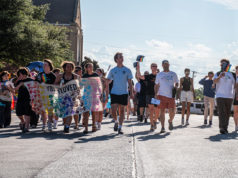Raegan Pebley’s TCU women’s basketball team sits undefeated through the first six games of her 16th season as a head coach. Pebley is only 44, and, in fact, got her first head coaching job at the age of 26. During those early 20-something years of coaching, Pebley met another woman in a similar situation. Her colleague had gotten the women’s head job at West Point at the age of 28, and Pebley could relate.
Like Pebley, Army’s new hire knew how to coach, no matter what her level of experience. She led her cadets to the school’s first NCAA tournament in her inaugural season. Unfortunately, it turned out to be Maggie Dixon’s only trip there, as the ascendant young coach passed away suddenly after the season due to an unforeseen heart condition.
Fast forward to 2019, and Pebley continues to coach. She’s on her third Division I stop, having made postseason play at Utah State, Fresno State, and now TCU. One of her colleagues in the athletic department shares a last name with Pebley’s late friend, and, in fact, TCU men’s coach Jamie Dixon is Maggie’s brother.
While Maggie Dixon was alive, she made quite an impression on people with her knowledge of the game and welcoming personality. Many of those who knew her have looked to keep her legacy alive. Immediately after her passing, an annual game featuring top women’s teams was named the Maggie Dixon Classic. It’s been played in multiple locations, but seems to have found a lasting home in Fort Worth. In Sunday’s doubleheader, TCU defeated Boise State to open the event and Florida State upset Texas A&M in the nightcap.
Before the game, Maggie’s brother and their sister Julie presented the Maggie Dixon Courage Award to the Nees family. The youngest Nees daughter, Emma, not only has down syndrome, she’s twice survived cancer. Her ailments couldn’t take away her natural joyfulness. When I met her later, Emma even offered me some of her candy. She brought a smile to the face of everyone on the court.
People like Emma and Maggie can serve as inspiration for people they come in contact with. In wanting to host the Classic at Schollmaier Arena, Pebley saw benefits for the part of the game’s future she influences most directly: her players. Watching them in the press conference after the game, it seemed apparent that they had been affected by what they learned of Maggie Dixon, both on Sunday and in the run-up to the event (which included a road game at West Point).
In the video interview that accompanies this post, Pebley shares her thoughts on what made that trip, and these games, special. It helps one understand why the future is likely to always include a Maggie Dixon Classic.











